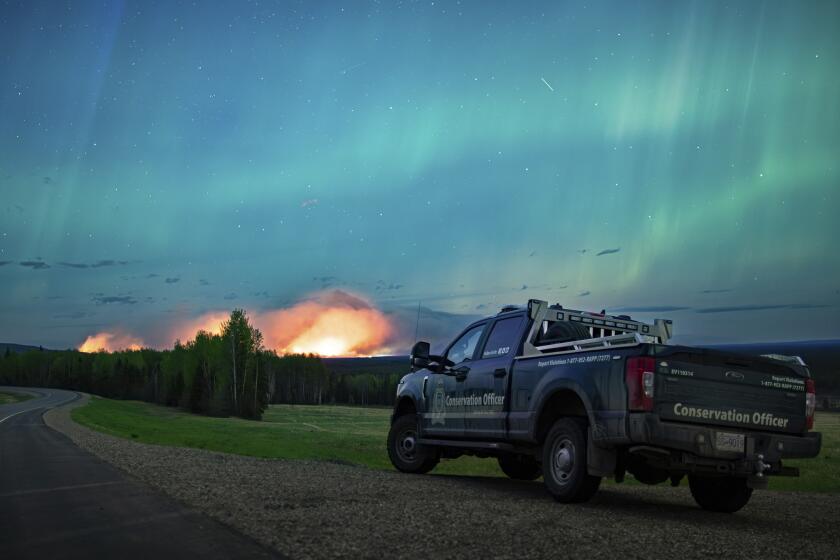Trade Route Needed : Fragile Economies Ail as Mozambique Civil War Drags On
A decade ago, thousands of guerrillas flooded across the border from Mozambique to mount a final assault against the white-minority government in what then was called Rhodesia.
Today, eight years after Rhodesia became black-governed Zimbabwe, battalions of troops, including guerrilla veterans of that independence war, are strung along the same border--this time to block a new wave of incursions by guerrillas fighting to overthrow Mozambique’s government.
The outcome of the guerrillas’ strikes in Mozambique and inside Zimbabwe will have a major impact on the fragile economies of the troubled region in southern Africa.
Several black-ruled states are striving to divert their trade traffic from South Africa to Indian Ocean ports in Mozambique, a former Portuguese colony, in a bid to loosen their economic dependency on the South Africans.
Vow of Sabotage
The rebels, in turn, vow to continue sabotaging Mozambique’s supply lines that also serve Malawi, Zaire, Zambia and Zimbabwe.
So far, the 12,000 to 20,000 guerrillas of the anti-government Mozambique National Resistance seem unharried by the conventional forces ranged against them in Mozambique and Zimbabwe--about 30,000 Mozambican regulars, more than 12,000 Zimbabweans, 2,000 Tanzanians and a few hundred Malawians.
The guerrillas, who call themselves nationalists opposing a Marxist-based government, roam Mozambique’s 10 provinces and mount frequent raids into Zimbabwe with virtual impunity.
“It’s very strange being on the other side,” said a young Zimbabwean corporal who fought the Rhodesians under the name Comrade Hammer. “We know from our experience it’s hard to beat guerrillas.
“But these people are just bandits, and at least we know exactly how they think and what they might do next.”
Formed in 1977
The guerrillas, known by the Portuguese acronym RENAMO, originally were formed by the Rhodesian intelligence service in 1977, two years after Mozambique’s independence from Portugal, to harass nationalist guerrillas directed by Robert Mugabe from inside Mozambique during Zimbabwe’s 1973-79 independence war.
Mugabe became Zimbabwe’s prime minister at independence from Britain in April, 1980, and cut support to the Mozambican rebels. But South Africa took over those reins until 1984, when it signed a nonaggression pact with Mozambique. Since then, Mozambique claims that South African support has continued, a charge denied by the South African government.
The Mozambican rebels declared war on Zimbabwe last year after Mugabe vowed that a quarter of his forces stationed in Mozambique would fight to keep its government in power.
Villagers Killed
Since then the rebels have stepped up raids along the 750-mile frontier of forested mountains and scrub-dotted plains.
Rebels have killed scores of villagers and some security-force militias. They have abducted hundreds of civilians, including children, and marched them at gunpoint into Mozambique, apparently as dragooned recruits.
They also have destroyed government schools, clinics and development projects; robbed country stores and remote homesteads of food, drink and clothing; ambushed buses and looted passengers; ordered workers to leave forestry estates, coffee plantations and orchards; and rustled cattle, sheep and goats.
Mugabe has exhorted his troops “to erect an impassable defense along our border” to prevent fresh incursions.
Plea to Civilians
He also urged them to renew military efforts inside Mozambique “to completely deny the enemy any . . . chance to sabotage our arteries to the sea.”
Lt. Col. Solomon Mujuru, a wartime guerrilla chieftain and now Zimbabwe’s army commander, called on civilians living along the frontier to report people they suspect might have links to the guerrillas.
But Mujuru said that Zimbabwean troops had gained the upper hand in counterinsurgency operations since the first major incursions eight months ago.
Before June, Mujuru’s soldiers and the rebels clashed only in Mozambique.
Since then, troops of Zimbabwe’s new 5,000-member 6th Brigade have reinforced border defenses, militias are guarding farms, villages, schools and clinics, and cross-border movement has been banned except at established immigration posts.
Mines at Border
Anti-personnel mines have been sown where guerrillas are thought to cross into Zimbabwe, and the identification papers of about 65,000 Mozambican refugees in three camps are being screened by local authorities and the U.N. High Commission for Refugees.
In addition, courts have cracked down on local peasants suspected of links to the insurgents. Early in February, a Mutare judge sent a woman to prison for six years and a man for five years for failing to report the presence of bandits to officials.
At stake in the conflict is not just the survival of Mozambique, its economy already in ruins as a result of fighting and famine.
Also at issue is the fate of the so-called Beira Corridor, a 186-mile trade route that meanders through mountains, fertile valleys and swamps from the Zimbabwean border to the Indian Ocean port of Beira in Mozambique.
Peace Talks Rejected
A fifth of the overseas trade of the black-ruled neighbor states flows along the corridor’s railroads and highways. Landlocked Zimbabwe receives most of its fuel supplies from a corridor pipeline despite repeated sabotage by the guerrillas. Most of that trade and oil previously went through South Africa.
Both Mugabe and President Joaquim Chissano of Mozambique have rejected suggestions that they hold peace talks with the guerrillas, arguing that the rebels are puppets of South Africa’s government and have no support from either the East or the West.
Mugabe, at the graduation ceremony for the 6th Brigade in September, said he was forced to form the unit because of what he called South African destabilization in the region.
“South Africa’s subversion of Mozambique’s . . . sovereignity had the potential to completely deny us any routes to the sea,” Mugabe said. “The survival of Mozambique is our survival. The fall of Mozambique certainly also will be our fall.”
EDITOR’S NOTE--Little noticed by the rest of the world, a guerrilla war in Mozambique has created a new and serious refugee problem in Africa, along with its toll in human life and economic loss since it began in 1977. But it also is having a deep impact on Mozambique’s black-governed neighbors in southern Africa and holds the seeds of an even wider regional conflict, swallowing people already struggling with poverty and drought.
Mozambique, Africa’s poorest nation, is on the Indian Ocean and provides its black neighbors their only trading outlet, except for nearby South Africa. But the neighbors’ efforts to cut their dependence on South Africa for trade routes by using a corridor through Mozambique have been disrupted by the guerrilla conflict.
“The survival of Mozambique is our survival,” Prime Minister Robert Mugabe of Zimbabwe says. “The fall of Mozambique certainly also will be our fall.”
Here are reports by Associated Press correspondents on how the war is affecting two of Mozambique’s closest neighbors.
More to Read
Start your day right
Sign up for Essential California for news, features and recommendations from the L.A. Times and beyond in your inbox six days a week.
You may occasionally receive promotional content from the Los Angeles Times.






